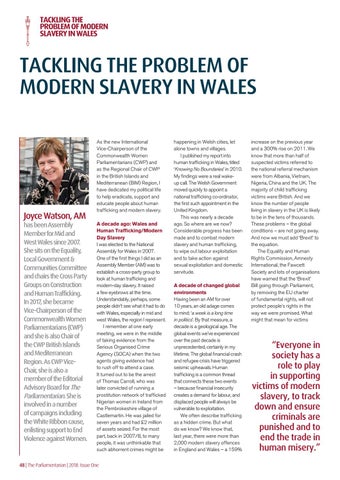TACKLING THE PROBLEM OF MODERN SLAVERY IN WALES
TACKLING THE PROBLEM OF MODERN SLAVERY IN WALES
Joyce Watson, AM
has been Assembly Member for Mid and West Wales since 2007. She sits on the Equality, Local Government & Communities Committee and chairs the Cross Party Groups on Construction and Human Trafficking. In 2017, she became Vice-Chairperson of the Commonwealth Women Parliamentarians (CWP) and she is also Chair of the CWP British Islands and Mediterranean Region. As CWP ViceChair, she is also a member of the Editorial Advisory Board for The Parliamentarian. She is involved in a number of campaigns including the White Ribbon cause, enlisting support to End Violence against Women.
As the new International Vice-Chairperson of the Commonwealth Women Parliamentarians (CWP) and as the Regional Chair of CWP in the British Islands and Mediterranean (BIM) Region, I have dedicated my political life to help eradicate, support and educate people about human trafficking and modern slavery. A decade ago: Wales and Human Trafficking/Modern Day Slavery I was elected to the National Assembly for Wales in 2007. One of the first things I did as an Assembly Member (AM) was to establish a cross-party group to look at human trafficking and modern-day slavery. It raised a few eyebrows at the time. Understandably, perhaps, some people didn’t see what it had to do with Wales, especially in mid and west Wales, the region I represent. I remember at one early meeting, we were in the middle of taking evidence from the Serious Organised Crime Agency (SOCA) when the two agents giving evidence had to rush off to attend a case. It turned out to be the arrest of Thomas Carroll, who was later convicted of running a prostitution network of trafficked Nigerian women in Ireland from the Pembrokeshire village of Castlemartin. He was jailed for seven years and had £2 million of assets seized. For the most part, back in 2007/8, to many people, it was unthinkable that such abhorrent crimes might be
48 | The Parliamentarian | 2018: Issue One
happening in Welsh cities, let alone towns and villages. I published my report into human trafficking in Wales, titled ‘Knowing No Boundaries’ in 2010. My findings were a real wakeup call. The Welsh Government moved quickly to appoint a national trafficking co-ordinator, the first such appointment in the United Kingdom. This was nearly a decade ago. So where are we now? Considerable progress has been made and to combat modern slavery and human trafficking, to wipe out labour exploitation and to take action against sexual exploitation and domestic servitude. A decade of changed global environments Having been an AM for over 10 years, an old adage comes to mind: ‘a week is a long time in politics’. By that measure, a decade is a geological age. The global events we’ve experienced over the past decade is unprecedented, certainly in my lifetime. The global financial crash and refugee crisis have triggered seismic upheavals. Human trafficking is a common thread that connects these two events – because financial insecurity creates a demand for labour, and displaced people will always be vulnerable to exploitation. We often describe trafficking as a hidden crime. But what do we know? We know that, last year, there were more than 2,000 modern slavery offences in England and Wales – a 159%
increase on the previous year and a 300% rise on 2011. We know that more than half of suspected victims referred to the national referral mechanism were from Albania, Vietnam, Nigeria, China and the UK. The majority of child trafficking victims were British. And we know the number of people living in slavery in the UK is likely to be in the tens of thousands. These problems – the global conditions – are not going away. And now we must add ‘Brexit’ to the equation. The Equality and Human Rights Commission, Amnesty International, the Fawcett Society and lots of organisations have warned that the ‘Brexit’ Bill going through Parliament, by removing the EU charter of fundamental rights, will not protect people’s rights in the way we were promised. What might that mean for victims
“Everyone in society has a role to play in supporting victims of modern slavery, to track down and ensure criminals are punished and to end the trade in human misery.”
